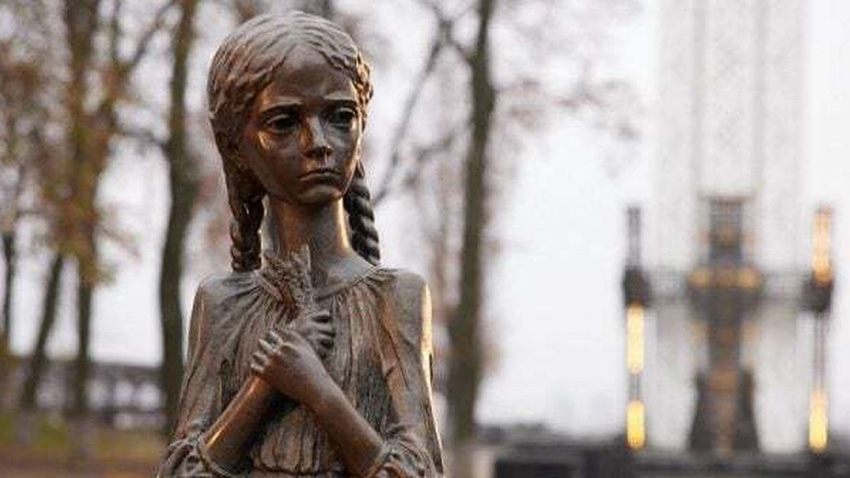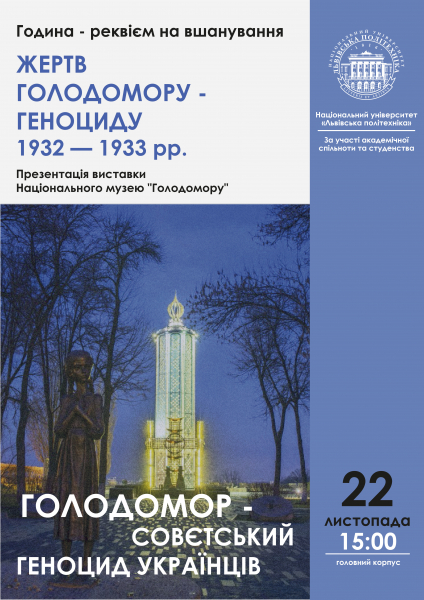In the early 30s of the last century, the chief communist of the USSR, Joseph Stalin, launched a large-scale offensive against everything Ukrainian. Later, Lviv lawyer Raphael Lemkin would call such actions «genocide». For the Ukrainian people, the Holodomor of 1932–1933 is a genocide constituted by Soviet regime. The Holodomor was preceded by political repression (executions, imprisonment) against Ukrainian cultural activists and the church. The peasants, the main bearers of national identity, were also targeted. Having been forced to work in collective farms, Ukrainian peasants became completely dependent on the authorities. The communists destroyed the wealthy peasants, eliminating their independence, as they considered them the basis of the national resistance movement.
The authorities decided to finally subdue the peasants by starvation. First, they set exorbitant grain procurement rates. Failure to comply was treated as sabotage and anti-Soviet activity. Forced requisitions began in the villages. For this purpose, special brigades were sent to the villages. In August 1932, the «law on five ears of grain» was adopted. People could be shot for violating this law. In-kind fines were introduced, and all food supplies were confiscated. Entire villages were punished. They were completely isolated from the outside world and surrounded by troops. Food deliveries stopped. The families died out as well as the whole villages. The deaths of millions were hidden from the world. Any information about the famine was treated as anti-state propaganda.
People who survived the Holodomor tried to preserve the memory by conveying the truth to their descendants. Among them there is Oleksandra Radchenko, a teacher from Kharkiv region. As a state employee, she received a ration, which helped her survive and save her three children from starvation. She saw the horror every day in front of her eyes. Radchenko recorded the truth about that terrible time in her diary. Here are some excerpts from her diary: «5 April 1932, Tuesday. The famine, an artificially created famine, is becoming terrible. No one understands why all grain is being taken away, and now when they see the result of this, they still continue to demand grain for sowing... The children are starving, tortured, thin, tormented by helminths, because they eat only beets, and even those are about to run out, and there are still four months before the harvest. What will happen? At the same time, the Pravda newspaper wrote about the opening of the first blast furnace in Europe, about the completed dams on the Dnipro River... Everyone was suffering from malnutrition or starvation. People lived a semi-beggarly life. Crime was growing especially fast in Kharkiv. People were stealing children and selling sausages made from human meat». «Why? Why children?» «I feel sorry for the children. They do not understand anything – they are not guilty».
Oleksandra Radchenko and her three daughters survived the Holodomor. In 1940, the family moved to Bukovyna. Her husband worked as a forester. In 1943, her 17-year-old daughter Elida was taken to Germany for forced labour. In 1944, the Soviet authorities took her husband to the front to join a penal battalion. On 7 July 1945, the NKVD arrested Oleksandra Radchenko. During the search, they found seven notebooks with diaries for the years 1926–1943. This was interpreted as anti-Soviet propaganda and agitation. On 14 December 1945, the Kamianets-Podilskyi Regional Court in Proskuriv sentenced Oleksandra Radchenko to 10 years in prison with 5 years of deprivation of rights under Article 54, paragraph 10, part 2 of the Criminal Code of the Ukrainian SSR, which provided for liability for counter-revolutionary activities (anti-Soviet propaganda and agitation). She served her sentence in the Gulag camps. She was released on 30 July 1955. She moved to the Kharkiv region, Vovchansk district, for permanent residence. In her diaries, Oleksandra Radchenko intended to convey to children the truth about the cruel methods used to build socialism. On 23 July 1991, she was posthumously rehabilitated (SSU Main Department. ACS No. 75164-FP).

